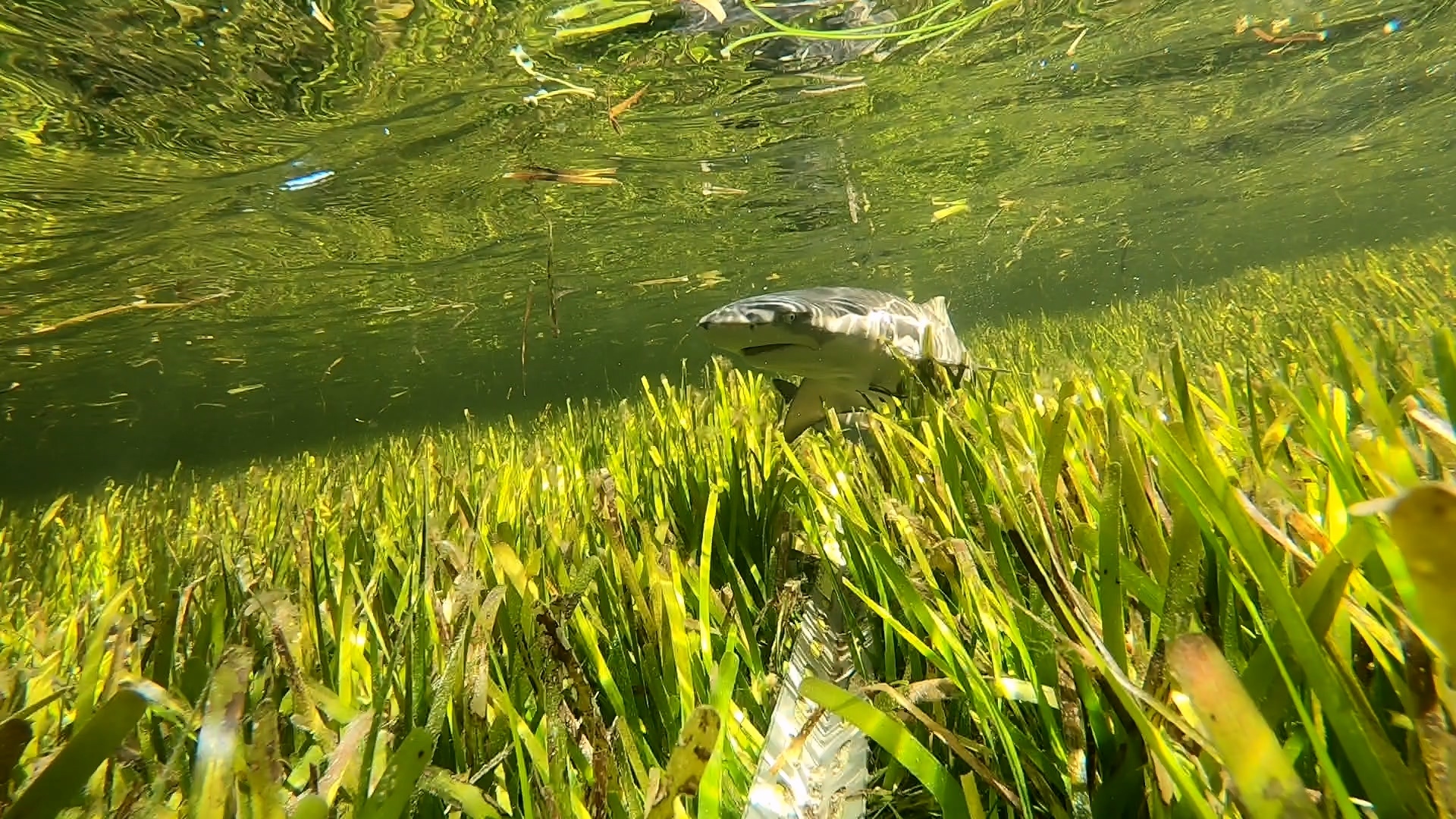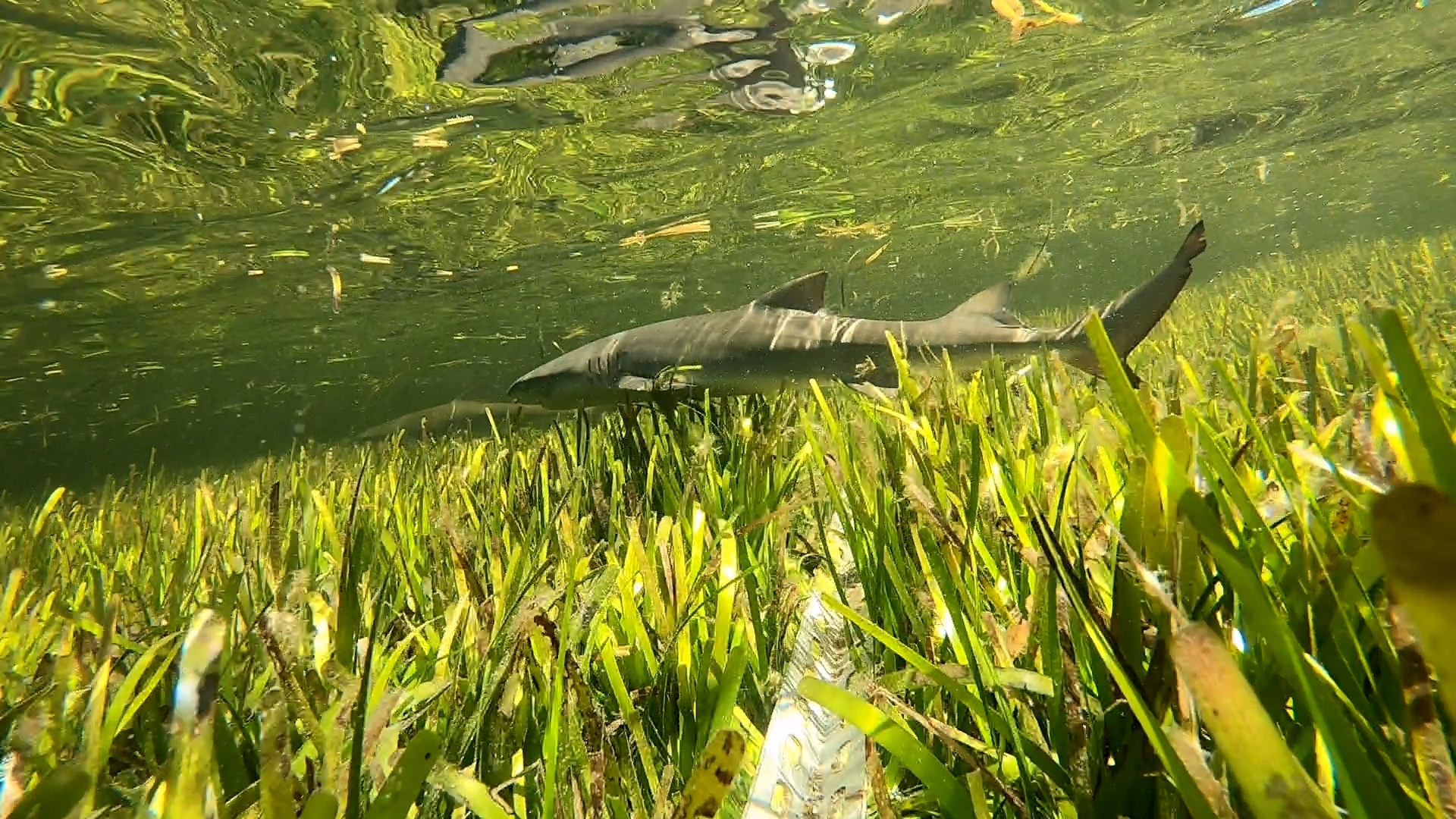Guarding the sharptooth lemon shark: NSYSU's collaborative research is published in the renowned international journal





2024-11-19
The "sharptooth lemon shark" (Negaprion acutidens), which swims gracefully in the beautiful seagrass beds, is at the risk of extinction, with Dongsha Island in Southeast Asia being the only remaining nursery ground, where a stable number of juvenile sharks are born every year. It is regarded as a wonderland for this species. Shang-Yin Vanson Liu, Professor of the Department of Marine Biotechnology and Resources at National Sun Yat-sen University (NSYSU), collaborated with Aletheia University in research and found that the juvenile sharks in Dongsha Island come from two major families and use it as an important nursery ground. Therefore, effective management of it is crucial for the survival of this species in the South China Sea. The research results were published in the internationally renowned journal Scientific Reports.
Professor Liu, together with NSYSU alumnus and Associate Professor Yu-Yun Chen from the Sport Management Department at Aletheia University, as well as the Marine National Park Headquarters, worked together to study the population dynamics, movement and their genetic relationships of juvenile sharptooth lemon shark around Dongsha Island. Liu pointed out that globally, there are only two species in the genus Negaprion: the lemon shark (Negaprion brevirostris) in the Atlantic and the sharptooth lemon shark (Negaprion acutidens), found in the Indo-Pacific region. Despite the limited distribution of lemon sharks, extensive research has been conducted on the population dynamics, migration, and reproductive behaviors of the lemon sharks due to high attention on cartilaginous fish resources in Europe and the U.S. In contrast, the sharptooth lemon shark has a broader distribution, but current population status in the wild has been assessed as Endangered by the International Union for Conservation of Nature's Red List of Threatened Species (IUCN Red List), and has been declared as local extinct in several southeast Asia countries.
Dongsha Atoll is the only place in the South China Sea where a stable population of juvenile sharks has been recorded. Based on population dynamic data from 2015 to 2021, an average population of 215 individuals. Professor Shang-Yin Vanson Liu mentioned that the sharptooth lemon shark is a flagship species in Dongsha with unique habits, previous studies show that female sharks return to their natal area to give birth, forming "nursery grounds." Juvenile sharks stay in shallow waters near the birthplace until the subadult stage before moving into deeper waters. Every spring, pregnant sharptooth lemon sharks are observed entering the shallow waters around Dongsha Island to give birth, and newborn pups are spotted each year in late spring and early summer with fairly stable numbers.
Professor Chen is conducting a long-term catch-and-release experiment around the Dongsha Island, and tracking their movement using acoustic tags. During the tagging process, tissue samples were collected and preserved for each of them. With the data he has, Professor Liu was curious about the genetic relationships among the juvenile sharks and between cohorts around Dongsha Island and was concerned about potential inbreeding, which could jeopardize the population's survival. Therefore, they jointly applied for a Ministry of Science and Technology-Granted Research Project, using Microsatellite DNA—commonly used in forensic science to identify perpetrators and paternity—as genetic markers to reveal kinship among different individuals of the juvenile sharks obtained through the catch-and-release studies between 2013 and 2017.
The research revealed that the genetic relationship between the juvenile sharks in Dongsha is not close and is mostly just "unrelated." Although a mother shark can give birth to about 14 to 18 newborn pups at a time, it is suggested that the high natural mortality could be the cause. Principal coordinate analysis showed that the juvenile sharks likely come from two breeding families, but most of them are distant relatives, merely sharing the nursery grounds. This suggests that Dongsha Island serves not only as a spawning ground for many female sharptooth lemon sharks but also an important nursery area for the South China Sea population. No other habitats have been reported in the past, further highlighting the importance of Dongsha Island.
In the heavily fished South China Sea, the reason that they can sustain a stable population is mainly due to the management and restrictions imposed by Dongsha Atoll National Park. However, if we fail to protect this habitat, the sharptooth lemon sharks may start to disappear in the South China Sea, without the top predators, the marine ecosystem could lose their function and diversity. Ultimately, nothing left in the ocean. He strongly suggested a thorough environmental impact assessment is needed before any development or tourism activities are initiated to safeguard the last sanctuary.
